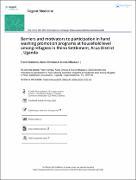Barriers and motivators to participation in hand washing promotion programs at household level among refugees in Rhino Settlement, Arua District - Uganda
Abstract
Introduction: The major aim of hand washing promotion programs is to persuade people to change their behaviour to reduce high-risk hygiene practices and use. Unfortunately, in a refugee setting, there is a dearth of information about participation in hand washing promotion programs. Objective: To assess barriers and motivators to participation in hand washing promotion programs at household level among refugees in Rhino Camp, Arua district, Uganda. Methods: A cross-sectional study was conducted to collect quantitative and qualitative data. A semi-structured questionnaire was used to collect data on participation, individual, household factors related to hand washing promotional programs from 312 refugees. Five key informant interviews were conducted to gather data on public policy, institutional and community factors related to participation in the hand washing promotion programs. Qualitative data were analyzed using thematic content analysis. Results: Only 19.6% (61/312) of the refugees had participated in hand washing promotion programs. Significant barriers to participation were; no formal education and staying in the camp for more than 3 years. The significant motivators were; households who had 6 to 10 members and more. Conclusion: Participation in hand washing promotion programs was low among the refugees. There is need for relevant stakeholders to come up with interventions to increase participation among the refugees while taking into consideration the potential barriers and motivators to their participation as identified by this study.


